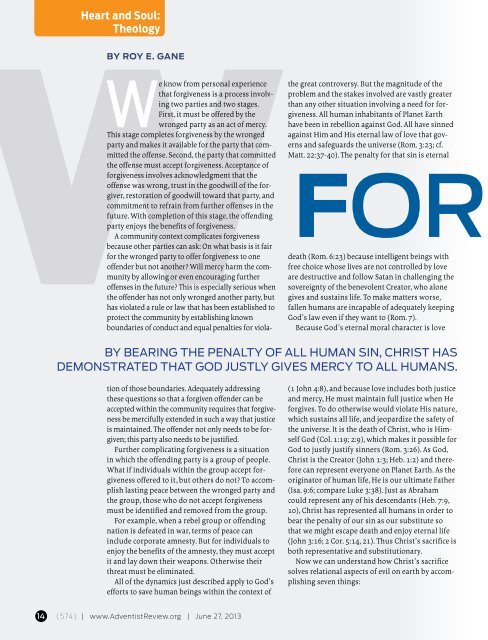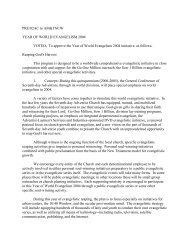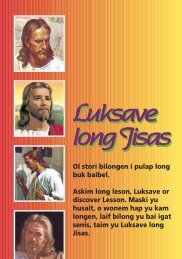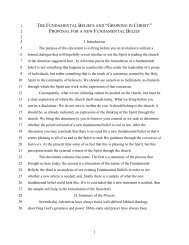Download PDF - Adventist Review
Download PDF - Adventist Review
Download PDF - Adventist Review
- No tags were found...
Create successful ePaper yourself
Turn your PDF publications into a flip-book with our unique Google optimized e-Paper software.
Heart and Soul:<br />
Theology<br />
BY ROY E. GANE<br />
the great controversy. But the magnitude of the<br />
problem and the stakes involved are vastly greater<br />
than any other situation involving a need for forgiveness.<br />
All human inhabitants of Planet Earth<br />
have been in rebellion against God. All have sinned<br />
against Him and His eternal law of love that governs<br />
and safeguards the universe (Rom. 3:23; cf.<br />
Matt. 22:37-40). The penalty for that sin is eternal<br />
FOR<br />
death (Rom. 6:23) because intelligent beings with<br />
free choice whose lives are not controlled by love<br />
are destructive and follow Satan in challenging the<br />
sovereignty of the benevolent Creator, who alone<br />
gives and sustains life. To make matters worse,<br />
fallen humans are incapable of adequately keeping<br />
God’s law even if they want to (Rom. 7).<br />
Because God’s eternal moral character is love<br />
BY BEARING THE PENALTY OF ALL HUMAN SIN, CHRIST HAS<br />
DEMONSTRATED THAT GOD JUSTLY GIVES MERCY TO ALL HUMANS.<br />
We know from personal experience<br />
that forgiveness is a process involving<br />
two parties and two stages.<br />
First, it must be offered by the<br />
wronged party as an act of mercy.<br />
This stage completes forgiveness by the wronged<br />
party and makes it available for the party that committed<br />
the offense. Second, the party that committed<br />
the offense must accept forgiveness. Acceptance of<br />
forgiveness involves acknowledgment that the<br />
offense was wrong, trust in the goodwill of the forgiver,<br />
restoration of goodwill toward that party, and<br />
commitment to refrain from further offenses in the<br />
future. With completion of this stage, the offending<br />
party enjoys the benefits of forgiveness.<br />
A community context complicates forgiveness<br />
because other parties can ask: On what basis is it fair<br />
for the wronged party to offer forgiveness to one<br />
offender but not another? Will mercy harm the community<br />
by allowing or even encouraging further<br />
offenses in the future? This is especially serious when<br />
the offender has not only wronged another party, but<br />
has violated a rule or law that has been established to<br />
protect the community by establishing known<br />
boundaries of conduct and equal penalties for violation<br />
of those boundaries. Adequately addressing<br />
these questions so that a forgiven offender can be<br />
accepted within the community requires that forgiveness<br />
be mercifully extended in such a way that justice<br />
is maintained. The offender not only needs to be forgiven;<br />
this party also needs to be justified.<br />
Further complicating forgiveness is a situation<br />
in which the offending party is a group of people.<br />
What if individuals within the group accept forgiveness<br />
offered to it, but others do not? To accomplish<br />
lasting peace between the wronged party and<br />
the group, those who do not accept forgiveness<br />
must be identified and removed from the group.<br />
For example, when a rebel group or offending<br />
nation is defeated in war, terms of peace can<br />
include corporate amnesty. But for individuals to<br />
enjoy the benefits of the amnesty, they must accept<br />
it and lay down their weapons. Otherwise their<br />
threat must be eliminated.<br />
All of the dynamics just described apply to God’s<br />
efforts to save human beings within the context of<br />
(1 John 4:8), and because love includes both justice<br />
and mercy, He must maintain full justice when He<br />
forgives. To do otherwise would violate His nature,<br />
which sustains all life, and jeopardize the safety of<br />
the universe. It is the death of Christ, who is Himself<br />
God (Col. 1:19; 2:9), which makes it possible for<br />
God to justly justify sinners (Rom. 3:26). As God,<br />
Christ is the Creator (John 1:3; Heb. 1:2) and therefore<br />
can represent everyone on Planet Earth. As the<br />
originator of human life, He is our ultimate Father<br />
(Isa. 9:6; compare Luke 3:38). Just as Abraham<br />
could represent any of his descendants (Heb. 7:9,<br />
10), Christ has represented all humans in order to<br />
bear the penalty of our sin as our substitute so<br />
that we might escape death and enjoy eternal life<br />
(John 3:16; 2 Cor. 5:14, 21). Thus Christ’s sacrifice is<br />
both representative and substitutionary.<br />
Now we can understand how Christ’s sacrifice<br />
solves relational aspects of evil on earth by accomplishing<br />
seven things:<br />
14 (574) | www.<strong>Adventist</strong><strong>Review</strong>.org | June 27, 2013

















